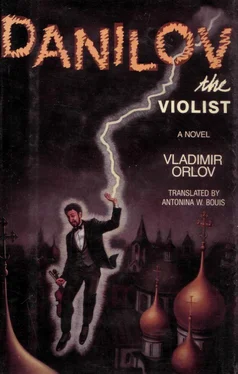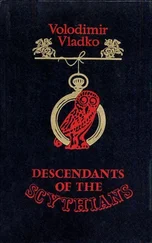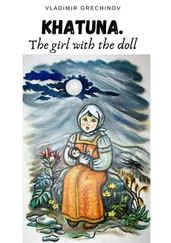The composer Pereslegin then said to him: "It seemed okay..." That was it. Did he mean Danilov's playing or his own music? Was he comforting Danilov, or himself? Pereslegin left right after that, and Danilov decided that Pereslegin was unhappy with him. "But when is a composer ever pleased with a performer?" Danilov asked himself, but that didn't make him feel any better. The conductor Chudetsky came over to him. Chudetsky was Danilov's age. He had a gentle manner and looked more like a diplomat than a conductor. But there was also something strong-willed and important about him. Chudetsky politely gave Danilov some advice, and settled on the time of the next rehearsal, He added, "I think this symphony will soar..." but he added it without conviction.
"It'll soar, all right," Danilov said to himself, sitting with the score that night. "The question is how high."
Danilov suffered. After the fourth rehearsal he told Pereslegin in measured tones that it wasn't too late to ask another violist. "No, no!" Pereslegin said firmly. And went off somewhere. Actually it seemed to Danilov that Pereslegin and Chudetsky were feeling better about him. And the eyes of the pit musicians seemed to display more interest in him. But Danilov still was gloomy.
Now he thought he understood how Pereslegin's music should be played. That made him more depressed. Could he play it that way?
Sometimes Danilov got angry with his instrument and would say with a sigh, "If I only had the Albani ..." But it wasn't a question of the Albani! If only it were! Danilov grew haggard, and he was already too thin in the first place.
Pereslegin was irritable, too; he didn't like his music, or the orchestra, or Danilov's playing, and probably the fact that the viola had a solo in his symphony. He stalked the stage like a woodsman; if an ax had suddenly appeared in his hands he would have chopped up the music stands and instruments, including the brass, in his anger. After such pacing, he would bark insulting words at the orchestra and then at Danilov.
Danilov became so frustrated that he had a fight with Natasha. Twice he promised to come over, and then reneged. Finally she called him; he was practicing and didn't return to reality fast enough, so he said something hurtful, and she took offense. At any other time, he would have sought her out immediately and smoothed things over. But this time he took offense himself. "She doesn't understand me," thought Danilov. "She doesn't care about my music!" Danilov blamed himself. "Have I thought about the people I care about lately? That's why I'm so lonely..." He immediately argued with himself. Who said he was lonely? He had lots of friends -- the Muravlyovs, for instance. They cared about his work; they were always ready to listen to him talk, and to help him out. They wouldn't help out an empty, selfish man, would they? Hardly ...
Danilov thought this way, alternately berating himself and justifying himself. Sometimes he promised to become a different person. But how different -- he had no idea. Yet for all this, he had no intention of making up with Natasha. Danilov was in a huff.
At last Danilov was pleased with his playing at a rehearsal. He even smiled that morning. When he got to the theater he learned that the violist Chekhonin would be going to Italy instead of him. "Well," Danilov said to himself, "Chekhonin deserves a trip, too." Even though he knew that Chekhonin was a lousy musician. And the others knew it, too. In the intermission Danilov wandered around glumly. He was hurt; he should have been storming offices, demanding, pleading. But Danilov wouldn't have done that even before ... He recalled the phone call from the skewbald futecon. "Here it is, the elder's curse!" Or was it? ... In the morning Danilov cautiously asked Chudetsky if there were any problems with the hall at the Palace of Electricity.
"Why?" Chudetsky said, surprised.
"Nothing, I just ... I was just wondering if there was a ballroom-dancing contest planned."
"I'll go find out," Chudetsky said.
Chudetsky left as the carefree maestro of Strauss waltzes, and returned ready for Tchaikovsky's Sixth.
"You're right, they're planning a ballroom dance contest," Chudetsky said. "That means we have to start the whole thing over again... What a shame ..."
Danilov wanted to suggest the House of Culture of Medical Workers but restrained himself. "Well, thanks a lot, fute-cons!" thought Danilov. "I'm going to start getting angry soon..."
That night Danilov's phone rang. Danilov got up slowly and picked it up reluctantly. It was Klavdia. She was suffering, she felt terrible, she wanted to see Danilov, she begged him to come over the next day.
"Forgive me, I don't have time," Danilov said.
"Volodenka, I never ask you for anything, but this time I need you... You must help me..."
"The hell with her!" thought Danilov. But Klavdia's voice sounded unusually pathetic. As if something had actually happened to her. The day before yesterday Danilov had been blaming himself for being self-centered, and now he was refusing to help a person in need. And Danilov wanted to find out more about the futecons from Klavdia.
At Voinov's apartment Danilov was greeted by Klavdia in a silk robe, with a scarf over her hair rollers. Danilov had expected Klavdia to come out crying and to throw herself into his arms for solace. "She's bugging me for nothing again," thought Danilov. Professor Voinov was home, too.
He shook Danilov's hand. Danilov noted that Voinov's belly was smaller -- he had been jogging the past few weeks.
On the living-room floor were four Old Castle wine bottles with corks inside. Voinov went back to the bottles. He sat down on a chair and tried to get the cork out of the nearest bottle with a shoelace. The fierce concentration required made him stick the corner of his tongue out. Danilov became anxious and crouched near by, ready to help.
"Let's go, come on," Klavdia said sharply.
"Yesterday I could do it," Voinov said, as if apologizing to Danilov, "but today the noose keeps slipping."
"Why is he doing that?" Danilov asked in the hallway.
"Just in case," Klavdia Petrovna said.
"You should use fishline..."
"We tried. The shoelace is better. And cheaper."
Klavdia led Danilov to her room and asked:
"So what do you want?"
"What do you mean? You called me in the middle of the night..."
"Oh, yes," Klavdia recalled. "All right. Sit down."
She sat down at a dressing table, and began writing with determination on a sheet of stationery. Her pen moved like Peggy Fleming on the ice during the obligatory program; the pen made flourishes that were particularly beautiful. This was Danilov's first time in Klavdia's room at Voinov's apartment.
"You're doing something urgent?" Danilov asked.
"Yes ... I mean, it's an important exercise. I'm writing to the queen of Belgium as Queen Elizabeth. Following a model."
Klavdia handed Danilov a gray book called Diplomatic Ceremony and Protocol and went on making loops. Danilov leafed through the book with great interest. He wouldn't have minded having one himself. There were paragraphs on boutonniиres; seating plans for honored guests at luncheons with ladies and without; and passages on state carriages with facing seats, where the place of honor, he learned, is the back right seat facing traffic. A silk bookmark was in the section on correspondence between monarchs. It offered models for compliments and forms of address to monarchial types. Klavdia, obviously following the advice of the Protocol, was writing a letter to the queen of Belgium.
"What are you doing this for?"
"You never know ..." Klavdia said evasively.
"So you are going to England?"
"Not for now. But this has more than just the British rules, it has French and so on... I may be doing it for no reason at all... just because it's interesting."
Читать дальше












